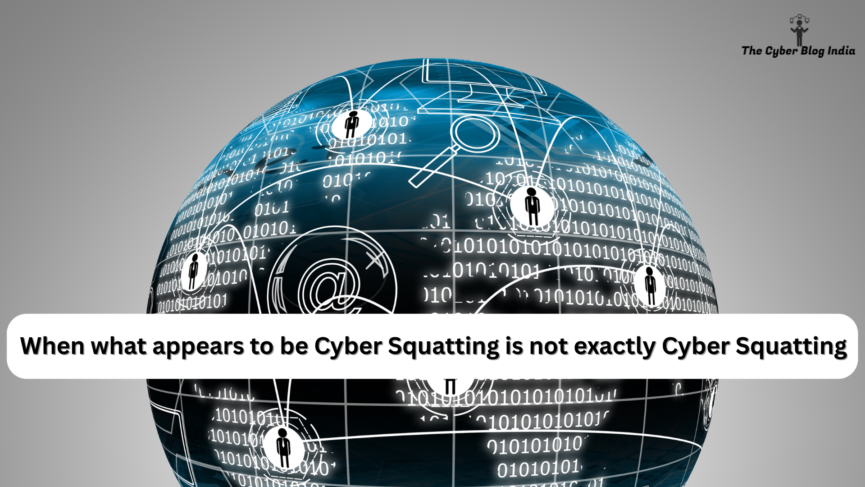When what appears to be Cyber Squatting is not exactly Cyber Squatting

Suppose you are a business owner and own a domain for your business. One day, you find that someone else, perhaps a competitor, has made a deceptively similar website to yours with a similar name, colour schemes, and other design elements. This deceptively similar website is affecting search rankings and eventually your business.
The practice, often called cyber squatting, involves registering and creating deceptively similar domain names in bad faith to profit from established trademarks, brand identities, and personal names. A more specific definition of cyber squatting is purchasing or creating domain names similar to existing businesses only to sell them back for profit. However, not every domain registration that appears identical or appears to be cyber squatting truly qualifies as the same. This article explores when a similar-looking domain name does not qualify as cyber squatting.
What really counts as cyber squatting in India?
Domain names are registered on a first-come, first-served basis, i.e., giving way to any individual who registers for it, without any check and verification process, unlike trademarks or copyrights, which require verification. Typically, cyber squatting requires three key elements:
-
Bad faith or intent to profit: The owner of the deceptively similar domain intends to cash in or exploit someone else’s trademark. For example, a perpetrator registered sbicards.com to exploit SBI’s brand value or sell it to SBI to make a profit.
-
Similarity to a well-known trademark: The domain name is deceptively or confusingly similar or close to an existing brand or name, as happened in the case of Tata Sky Ltd. v. Sachin Cody & Ors. The court ruled that the domain name “TataSkyPlusHD” is deceptively similar to the original domain of Tata Sky Ltd.
-
No legitimate use: The owner of the deceptively similar domain has no genuine use, business, legitimate link, or connection to the name used.
When Cyber Squatting is NOT Cyber Squatting
There are several situations, more common than expected, where domain disputes do not actually hold up in court. First, one such exception is generic words on which no individual or company can claim ownership. For example, a business using the name of a god or goddess in its name cannot claim sole ownership over the same.
Second, using a person’s name or surname, place of business, and name of any predecessors of business without any intent to harm others constitutes fair use and does not result in cyber squatting. Similarly, in Somashekar P. Patil v. DVG Patil, the court, while ruling on using the name “Patil,” reiterated that the same was justified and fair as it used the person’s surname.
Third, domain names made in the expression of free speech, without commercial incentive, and for the purpose of criticism, parody, or commentary often fall under the protections of free speech. For example, “KodakComplaints.com” is a website for accumulating negative reviews for Kodak, and it does not intend to derive commercial incentive.
Fourth, using a common name in any industry not identical to the registered one does not qualify as cyber squatting. For instance, Lotus is not only the name of a car company but also a range of pharmaceutical and beauty products, both of which have different applications.
Conclusion
Not every domain name dispute is a clear case of black versus white, or right versus wrong. The Internet Assigned Numbers Authority (IANA) monitors domain names and their registrations; the sheer volume of domain registrations makes it difficult to prevent all instances of cyber squatting. However, ICANN’s Uniform Domain Name Dispute Resolution Policy (UDRP) provides recourse in domain name disputes. Similarly, India has adopted the .IN Domain Name Dispute Resolution Policy (INDRP) to resolve disputes for domain names ending with .in.
India, in particular, has a chronic absence of specific legislation on cyber squatting. Instead, most cases are handled under the Trade Marks Act, 1999, and common law principles. This legal ambiguity and absence of a steadfast criterion lead to uncertainty, as decisions are made on a case-by-case basis. This obscurity and indecisiveness highlight the urgent and nuanced need for well-defined legislation in India, one that balances trademark protection, free speech, and legitimate business activity in cyber space.
